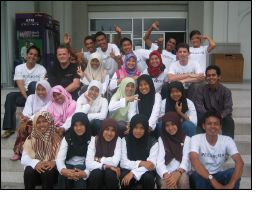 It's all been a bit of a disaster on the blog front - but here's the first blog entry since landing in Phuket, Thailand, two weeks ago. I have travelled here with Matthew Eaves on a project jointly supported by the British Council, Ultralab and Apple. The aim has been to work with children from Pattani on a digital creativity project with the intention of bring together communities of children as part of the Connecting Futures outreach work that has been very successful.
It's all been a bit of a disaster on the blog front - but here's the first blog entry since landing in Phuket, Thailand, two weeks ago. I have travelled here with Matthew Eaves on a project jointly supported by the British Council, Ultralab and Apple. The aim has been to work with children from Pattani on a digital creativity project with the intention of bring together communities of children as part of the Connecting Futures outreach work that has been very successful.
Matthew and I had intended to work in Pattani, but with the current unrest aimed towards westerners, it was felt safer that we move the venue to Phuket. Two workshops had been arranged during the two weeks we had been invited and used the well-respected SummerSchool format where the participants gained new skills with using digital video cameras and iMovie software. Of course there was more to learn than just the technology... this is about process and collaboration, judgements and decisions, planning, execution and performance.
Even though we already know lots about children making movies (our research in digital creativity work using the SummerSchool format stretches back over the past 6 years) there were still several surprises.
Curiously enough, the children's capacity to write their own soundtracks to their movies was staggering. We had emphasised how audio clues are significant in setting the mood of the film... and there are many examples in the films produced over the past two weeks to evidence participants using sound to amazing effect.
We chose to film a 'reflections' piece where individual pupils spoke of their experiences over the past 5 days. What was exceptional here wasn't just the comments the pupils made, but their confidence to speak in front of the camera. Quite astonishing really since children in England are often quite reserved and come across quite shy when confronted with such a situation.
One girl, Rus, commented, paraphrased below...
"I now understand how TV is made, I can now make TV"
We've had a fantastic learning opportunity here.. there is lots more to tell... and hopefully, as I venture further, to New Zealand, I will be able to piece that together in a more cohesive form. Matthew and I are just heading out to meet with Gerard from Apple Asia (flying in from Singapore as I type), a key individual who supported this event - and at the eleventh hour. He wants to know more about the work of Ultralab and the digital creativity work particularly, and explore how we might develop this relationship in the future.
The photograph on the left is pupils from the week 2 of the workshop. Take a look at some more photographs.